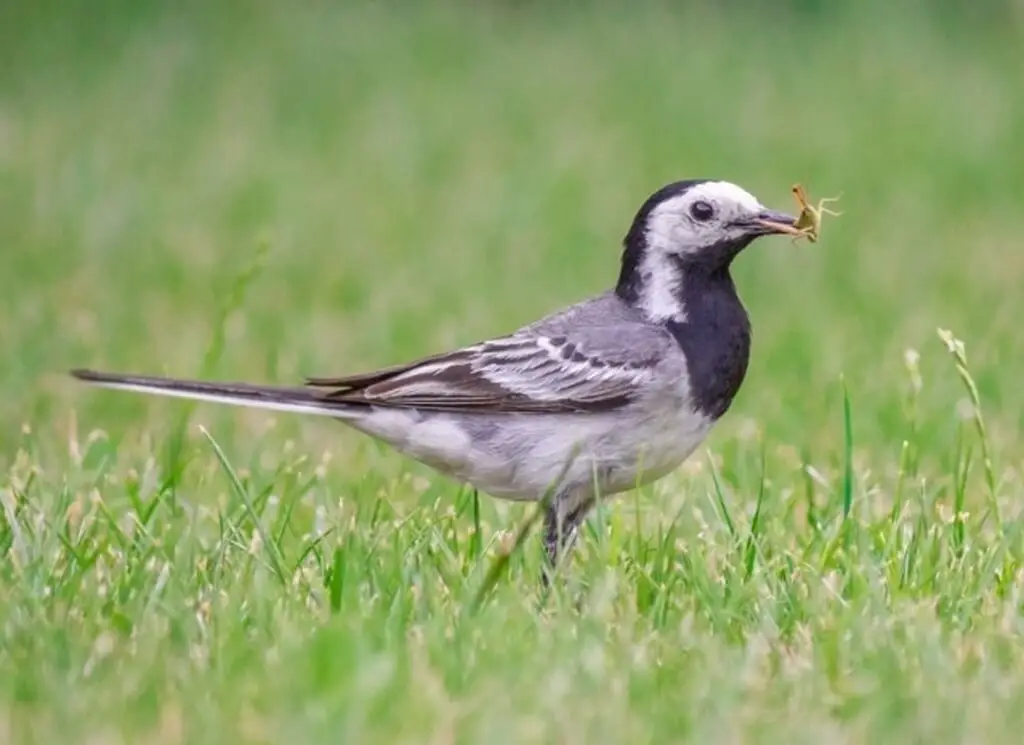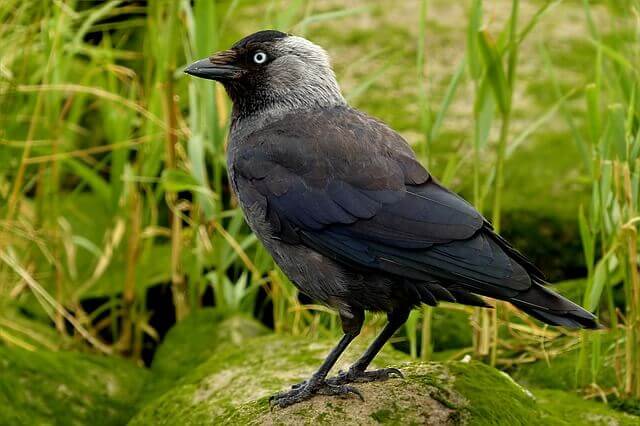Welcome to a fascinating journey into the world of avian predators. In this exploration, we’ll discover some remarkable bird species that have a taste for spiders. Join us as we unravel the secrets of their unique dietary choices and the intriguing role they play in our ecosystems. From agile flyers to ground-dwelling hunters, let’s dive into “24 Birds That Eat Spiders.”
Table of Contents
- 1 Birds That Eat Spiders
- 1.1 Bluebirds
- 1.2 Wrens
- 1.3 Woodpeckers
- 1.4 Thrushes
- 1.5 Shrikes
- 1.6 Sparrows
- 1.7 Chickadees
- 1.8 Flycatchers
- 1.9 Jackdaws
- 1.10 Robins
- 1.11 Tanagers
- 1.12 Hummingbirds
- 1.13 Hawks
- 1.14 Eagles
- 1.15 Owls
- 1.16 Common Nighthawks
- 1.17 Pigeons
- 1.18 Spiderhunters
- 1.19 Eurasian Blue Tits
- 1.20 Great Tits
- 1.21 Gray Catbirds
- 1.22 American Crows
- 1.23 Common Blackbirds
- 1.24 Barn Swallows
- 2 When to Encourage Birds to Eat Yard Spiders?
- 3 How Do I Keep Spiders Away From My House?
- 4 Author
Birds That Eat Spiders
Bluebirds
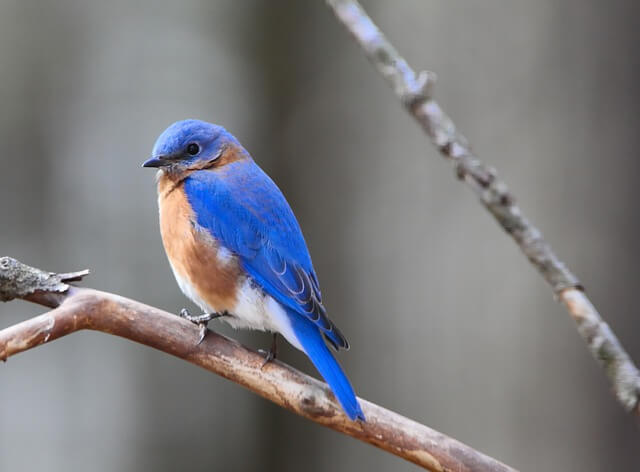
Bluebirds, with their striking azure plumage, are not only a delight to behold but also serve as valuable allies in pest control, thanks to their penchant for dining on spiders. This dietary preference offers several benefits to both the bluebirds and gardeners alike.
Spiders are a rich source of protein and essential nutrients, making them an ideal food source to sustain these birds throughout the year, especially during the breeding season when they require ample energy.
By attracting bluebirds to your garden, you can naturally reduce the spider population, contributing to a balanced ecosystem and potentially mitigating the presence of other garden pests.
To entice bluebirds to your yard, provide them with suitable nesting sites like birdhouses, open areas with low shrubbery, and ample water sources.
Additionally, consider offering mealworms in feeders to supplement their diet, creating an enticing habitat that encourages these beautiful birds to frequent your outdoor space.
Wrens
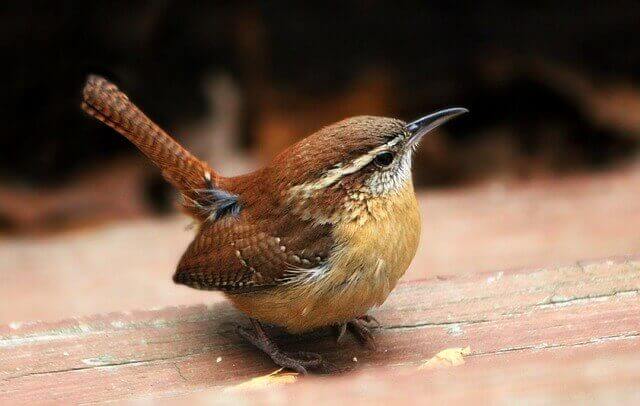
Wrens, renowned for their charming songs and lively personalities, also play a valuable role in spider control within their respective habitats. These small but energetic birds exhibit a voracious appetite for spiders, among other insects, making them effective pest controllers in gardens and woodlands.
The advantages of attracting wrens to your outdoor space are multifaceted. Their diet rich in spiders helps keep arachnid populations in check, contributing to a healthier ecosystem while simultaneously reducing potential garden nuisances.
To attract wrens to your garden, create a welcoming environment with dense shrubbery, trees, and brush piles that provide suitable nesting spots. Installing wren-specific birdhouses with small entrance holes can also be highly effective.
Supplying a variety of insects, including mealworms and suet, can further enhance your garden’s appeal to these industrious and melodious little birds. By doing so, you not only enjoy their delightful songs but also benefit from their natural pest control services.
Woodpeckers
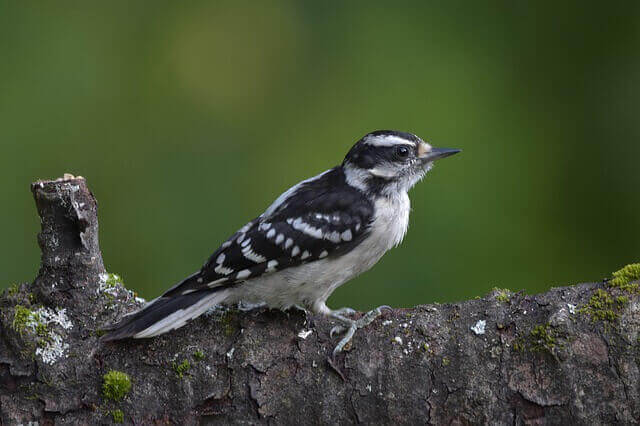
Woodpeckers, with their distinctive drumming and pecking behavior, are fascinating birds known for their appetite for insects, including spiders. Attracting woodpeckers to your outdoor space can have several advantages.
These avian acrobats are excellent at controlling insect populations, particularly wood-boring beetles and spiders, which can be damaging to trees and wooden structures. By welcoming woodpeckers, you help maintain the health of your local flora and reduce the need for chemical pest control methods.
To entice woodpeckers, offer them a habitat with mature trees, as they prefer to nest and forage in wooded areas. Installing suet feeders, filled with high-energy suet cakes that often contain insects and spiders, can be particularly enticing to woodpeckers.
Additionally, leave dead trees or snags standing in your yard, as they serve as valuable foraging sites and nesting locations. By creating an inviting space, you can enjoy the sight and sound of woodpeckers while benefiting from their natural pest control services.
Thrushes
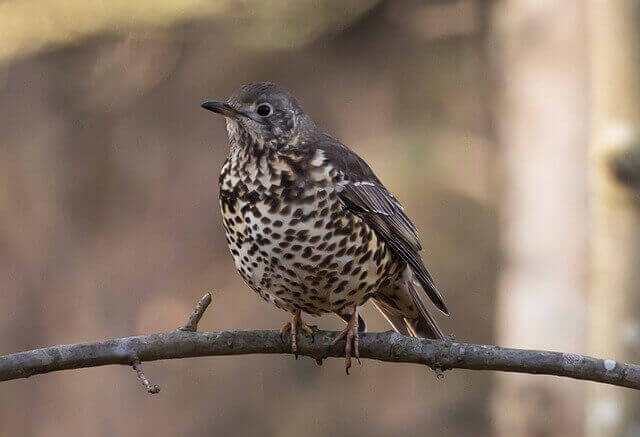
Thrushes, known for their melodious songs and graceful appearance, contribute to the ecosystem by consuming a variety of insects, including spiders. Their affinity for spiders provides several advantages, both for these birds and the environment.
By dining on spiders, thrushes help maintain a balanced arachnid population, preventing potential infestations and aiding in pest control in gardens and forests.
Moreover, spiders are a valuable source of protein and nutrients, crucial for thrushes’ health and energy, especially during the breeding and migration seasons.
To attract thrushes to your outdoor space, create a welcoming habitat with a mix of shrubs, trees, and open areas where they can forage for insects and build nests.
Providing a water source and offering a diverse range of food, such as berries, mealworms, and suet, can increase the likelihood of these enchanting birds gracing your garden with their presence, enhancing its ecological balance.
Shrikes

Shrikes, often referred to as “butcher birds” due to their unique hunting behavior, primarily prey on insects, small vertebrates, and occasionally spiders. While spiders may not be their primary food source, attracting shrikes to your area can still have some benefits.
These birds are known for impaling their prey on thorns or barbed wire, which helps them store food for later consumption. This behavior can include spiders, adding to their dietary variety and aiding in pest control.
Shrikes can help keep insect populations in check, which indirectly benefits your garden by reducing potential pest issues. To attract shrikes to your location, create a suitable habitat with a mix of open spaces and shrubs or low vegetation for perching and hunting.
Additionally, providing a consistent source of food such as small rodents, insects, and even raw meat can make your garden a more enticing destination for these fascinating and predatory birds.
Sparrows

Sparrows, the ubiquitous and sociable little birds found in urban, suburban, and rural settings alike, also play a role in controlling spider populations. While spiders aren’t their primary food source, sparrows will consume spiders when they come across them.
The benefits of attracting sparrows to your garden are manifold. Their diverse diet, which includes spiders along with seeds, grains, and small insects, contributes to a more balanced local ecosystem by helping keep various pest populations in check.
To attract sparrows to your yard, offer a variety of seeds in bird feeders, including sunflower seeds and millet. Planting native grasses, providing dense shrubbery for cover, and installing birdhouses with small entrance holes can also create an inviting environment for sparrows.
While they may not be as specialized as some other birds in spider control, their presence can contribute to a healthier and more diverse bird population in your area, which, in turn, aids in overall pest management.
Chickadees

Chickadees, renowned for their charming personalities and distinctive “chick-a-dee-dee-dee” call, are insectivorous birds with a particular fondness for spiders. Attracting chickadees to your garden comes with several benefits.
These small birds are efficient insect hunters, including spiders, which helps maintain a balanced ecosystem and control pest populations naturally. Chickadees are also entertaining to observe and their cheerful presence can add joy to your outdoor space.
To attract chickadees, create a bird-friendly environment by offering suitable nesting spots like birdhouses with small entrance holes. Providing a variety of food sources is crucial; chickadees enjoy seeds, nuts, and suet in addition to insects like spiders.
By offering a diverse menu and ensuring a consistent water source, you can entice chickadees to visit your garden, where they’ll help keep unwanted insect populations in check while providing delightful entertainment.
Flycatchers
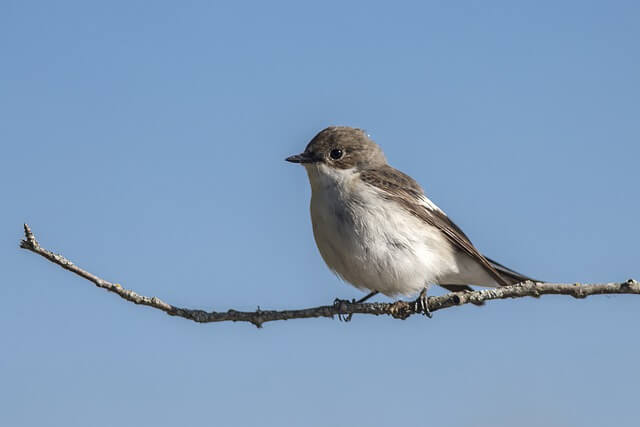
Flycatchers, a diverse group of birds found across various habitats, also contribute to pest control by targeting flying insects, including spiders. Their specialized hunting techniques make them effective insect hunters, offering several benefits to the ecosystem and those seeking natural pest management.
By preying on spiders and other flying insects, flycatchers help keep populations in check, reducing the potential for garden and agricultural pest outbreaks. This natural pest control can lead to healthier ecosystems and more sustainable pest management practices.
To attract flycatchers to your garden, ensure a diverse insect population by maintaining a habitat rich in native plants and providing water sources.
Additionally, consider setting up birdhouses or nesting sites tailored to the specific flycatcher species in your area, and they may become regular visitors, aiding in your garden’s pest control efforts.
Jackdaws
Jackdaws, highly adaptable and sociable members of the crow family, primarily feed on a varied diet consisting of insects, grains, fruits, and occasionally, spiders. Their inclination towards consuming spiders carries several benefits, both for these birds and their surroundings.
Jackdaws help control the spider population in their habitats, contributing to a natural balance in ecosystems while minimizing the presence of these arachnids as potential pests.
Spiders, being rich in protein and nutrients, serve as a valuable source of sustenance for jackdaws, especially during the nesting season when they require extra energy.
To attract jackdaws to your area, provide suitable nesting opportunities like nest boxes or cavities in trees. Supplement their diet with grains, seeds, and kitchen scraps while ensuring a source of freshwater.
By fostering a welcoming environment, you can encourage these intelligent and charismatic birds to become regular visitors, contributing to a healthier and more vibrant local ecosystem.
Robins
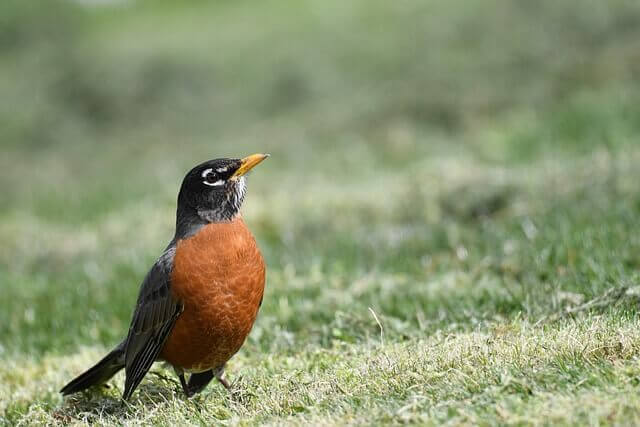
Robins, beloved for their distinctive red breasts and cheerful songs, play a vital role in managing spider populations within their habitats. These versatile birds are omnivorous, and while they primarily feed on earthworms, they also relish spiders and insects.
Their consumption of spiders benefits both the robins and the environment. Spiders provide essential protein and nutrients that support robins’ overall health, particularly during the breeding season when their energy needs are higher.
For the environment, robins help control spider populations, contributing to the balance of local ecosystems. To attract robins to your garden, create an inviting environment with open areas for foraging, a water source for drinking and bathing, and plenty of natural cover for nesting.
Offer a variety of foods such as mealworms, fruit, and suet to diversify their diet and encourage them to visit your outdoor space, where their presence will not only bring joy but also assist in managing spider and insect populations.
Tanagers
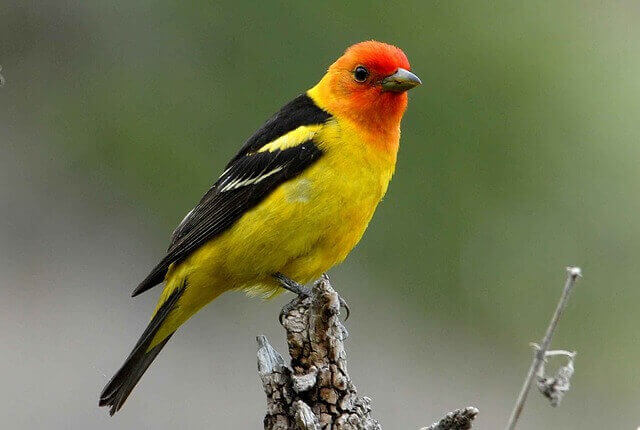
Tanagers, renowned for their vibrant plumage and captivating presence, typically have a diet that includes a variety of insects, including spiders. Attracting tanagers to your garden can offer several benefits to both these striking birds and your local ecosystem.
By consuming spiders, tanagers contribute to natural pest control, helping to keep arachnid populations in check and reducing potential garden nuisances.
Additionally, spiders are a valuable source of protein and nutrients, which are essential for the health and vitality of tanagers, particularly during the breeding and migratory seasons.
To attract these colorful birds to your outdoor space, consider planting a diverse range of native trees and shrubs that provide cover and food sources.
Offering a mix of fruits, insects, and suet can be particularly appealing to tanagers, encouraging them to visit your garden and contribute to its ecological balance while providing you with the pleasure of observing their stunning beauty.
Hummingbirds

Hummingbirds, with their vibrant plumage and remarkable hovering flight, primarily feed on nectar from flowers, but they also consume insects, including spiders, as an essential source of protein. While nectar is their primary energy source, spiders offer supplementary benefits.
These tiny birds help control the spider population in their habitat, contributing to ecological balance. Attracting hummingbirds to your garden is a rewarding endeavor.
Planting nectar-rich flowers like tubular-shaped blooms in various colors and providing a consistent nectar supply through hummingbird feeders can be highly effective. Incorporating a diverse range of insect-attracting plants can also indirectly support their spider consumption.
By creating a hospitable environment with a mix of flowers, water sources, and perches, you not only invite the enchanting presence of hummingbirds but also aid in maintaining a harmonious ecosystem while they occasionally indulge in their spider snacks.
Hawks
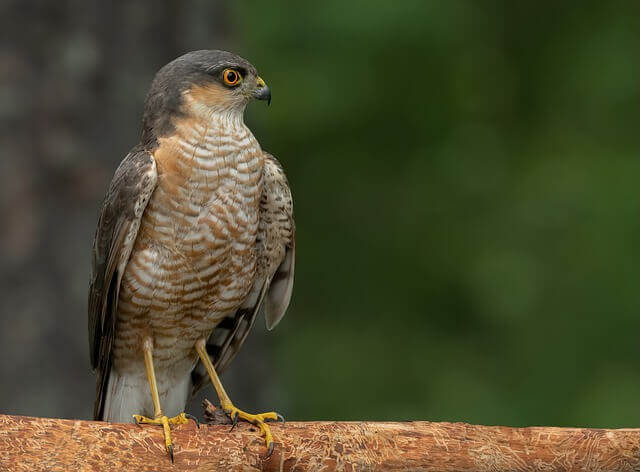
Hawks, as apex predators in the avian world, do not typically feed on spiders as a primary food source. They primarily hunt and consume larger prey, such as small mammals, birds, and sometimes reptiles and amphibians.
While they may inadvertently ingest spiders when devouring their prey, hawks are not specifically attracted to or known for targeting spiders in their diet.
Instead, they play a critical role in controlling populations of rodents and other small animals, which can indirectly help control spider populations by reducing the availability of prey for the spiders.
To attract hawks to your area, consider creating a diverse ecosystem with ample food sources for their preferred prey, like field mice and rabbits, rather than attempting to attract them through spiders.
Eagles
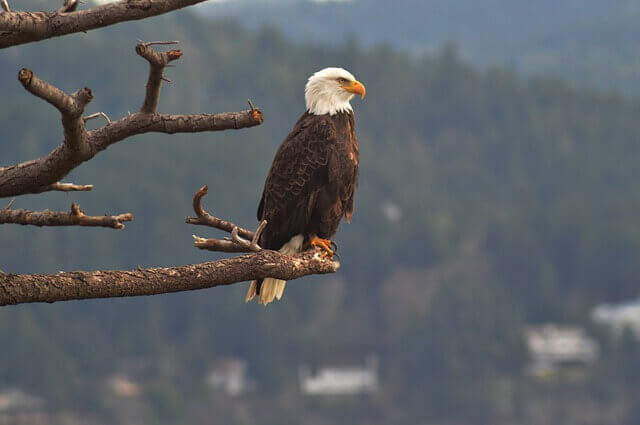
Eagles, as majestic and powerful raptors, have a diverse diet that includes a wide range of prey, but spiders are not typically a significant part of their menu. These apex predators primarily feed on mammals, birds, and fish, depending on their species and habitat.
While eagles may occasionally consume small arthropods like insects and spiders, it is not a significant portion of their diet, and they are not known for actively seeking out spiders as a food source.
Instead, eagles play a crucial role in controlling populations of larger prey animals, helping to maintain the balance of their ecosystems.
To attract eagles to your area, focusing on providing suitable habitat, such as a nearby water source and appropriate perches for hunting, is more effective than attempting to entice them with specific food sources like spiders.
Owls
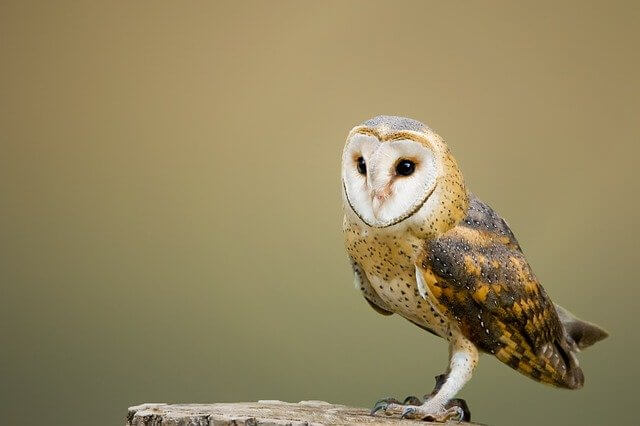
Owls, the enigmatic and nocturnal hunters of the avian world, are not commonly associated with eating spiders as their primary diet. However, they are known to consume spiders on occasion, especially when other prey is scarce.
The benefits of owls in ecosystems primarily stem from their remarkable rodent control abilities. Owls are expert hunters of small mammals like mice, rats, and voles, which can be prolific pests in agricultural areas.
By keeping these populations in check, owls help reduce crop damage and prevent the spread of diseases carried by rodents. To attract owls to your vicinity, consider installing owl boxes or nesting platforms in suitable locations.
These structures mimic natural tree cavities where owls often nest. Additionally, creating a diverse habitat with native plants and avoiding the use of pesticides can help support the owl’s food chain and encourage these magnificent birds to become natural allies in your pest management efforts.
Common Nighthawks
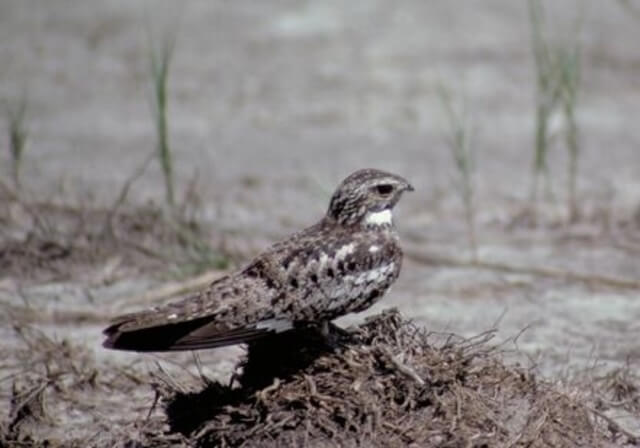
Common Nighthawks, despite their name, are not hawks but rather members of the nightjar family known for their distinctive aerial acrobatics and their preference for dining on flying insects rather than spiders.
These birds are crepuscular, meaning they are most active during dawn and dusk, when insects are abundant. Their diet mainly consists of moths, beetles, and other flying insects, making them valuable for pest control in urban and rural areas alike.
Attracting Common Nighthawks to your vicinity can be a bit more challenging than other birds, but it is possible. Open areas with ample flying insect populations are key, and they are often attracted to well-lit areas during twilight hours.
If you wish to encourage them to visit your outdoor space, consider installing outdoor lights that attract insects, which in turn will draw the Common Nighthawks.
Creating an inviting atmosphere with comfortable roosting spots can also make your property more appealing to these unique and beneficial birds, helping to control pesky insects in the process.
Pigeons
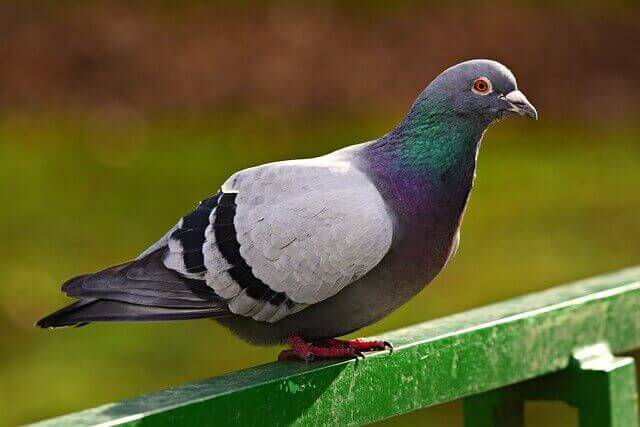
Pigeons, often seen as urban birds, are opportunistic eaters with a versatile diet that can include spiders, among other food sources. While pigeons do not primarily rely on spiders for sustenance, they may consume them occasionally, especially in urban environments where their food options are diverse.
Pigeons typically feed on grains, seeds, and small insects, but the occasional spider can provide added nutritional variety to their diet. The benefits of attracting pigeons to your area may include their participation in seed dispersal, which can contribute to plant growth and ecosystem health.
To attract pigeons, you can provide a bird feeder with seeds and grains, or scatter birdseed on the ground. Ensure a source of fresh water is available, and consider placing a birdbath or shallow container for them to drink and bathe.
However, it’s important to note that in some urban settings, pigeons can become overpopulated, so it’s essential to manage their presence to maintain a healthy balance in the local bird population.
Spiderhunters
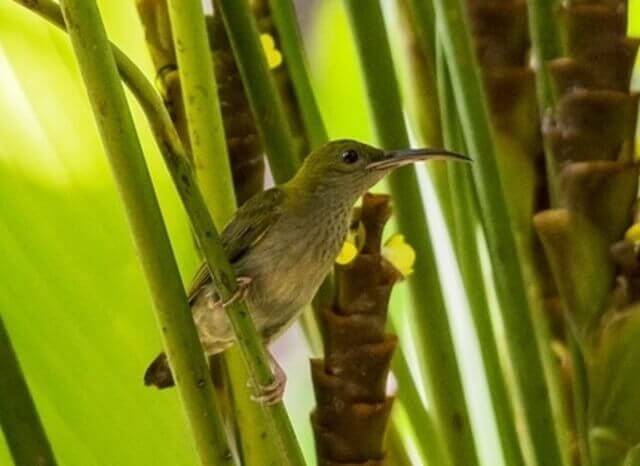
Spiderhunters, a specialized group of birds primarily found in Southeast Asia, are aptly named for their unique feeding habits centered around spiders and insects. These avian marvels rely heavily on spiders for their diet, and this preference brings several benefits to the birds and their ecosystems.
By consuming spiders, spiderhunters help regulate arachnid populations, which is particularly important in tropical regions where spiders can become abundant.
Additionally, spiders provide an excellent source of protein and essential nutrients, aiding spiderhunters in maintaining their energy levels for their active foraging and flying lifestyles.
Attracting spiderhunters to your garden, if you live in their native range, may require specific efforts like providing nectar-rich flowers and suitable nesting sites, as well as offering a variety of insects to supplement their diet.
By doing so, you can not only enjoy the presence of these unique birds but also promote a healthier and more balanced ecosystem.
Eurasian Blue Tits
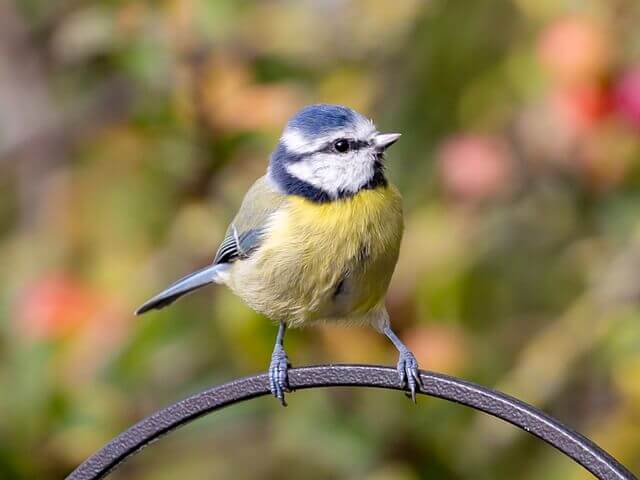
The Eurasian Blue Tit, with its vivid blue and yellow plumage, is a delightful garden visitor that also contributes to natural pest control by consuming spiders and various insects. Attracting Eurasian Blue Tits to your outdoor space offers multiple advantages.
These charming birds help keep spider populations in check, which can be especially beneficial in maintaining a balanced ecosystem and reducing potential pest issues in your garden. Additionally, by foraging on spiders and insects, they provide a natural and chemical-free method of pest control.
To entice Eurasian Blue Tits to your garden, consider installing nest boxes or birdhouses, as they readily nest in cavities. Provide a mix of food sources, including seeds, nuts, suet, and mealworms, to cater to their varied diet.
Also, ensuring a fresh water source is available can make your garden even more appealing to these colorful and helpful garden companions.
Great Tits
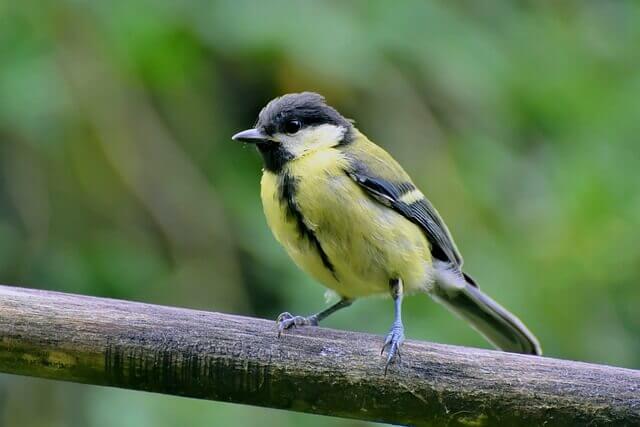
The Great Tit, with their distinctive yellow plumage and bold personalities, are not just charismatic garden visitors but also valuable allies in pest management. These birds have a diverse diet that includes spiders, among other insects, and this dietary preference comes with multiple benefits.
Their consumption of spiders helps regulate arachnid populations in your garden, reducing potential pest issues. Furthermore, spiders provide essential protein and nutrients, making them an important food source for Great Tits, especially during the breeding season when they require ample energy.
To attract Great Tits to your garden, consider providing suitable nesting boxes or birdhouses, as they are cavity-nesting birds. Offering a variety of food, including sunflower seeds, suet, and mealworms, can further entice them.
By creating an inviting environment with food and shelter, you can encourage these delightful birds to frequent your outdoor space, promoting natural pest control and enhancing the biodiversity of your garden.
Gray Catbirds
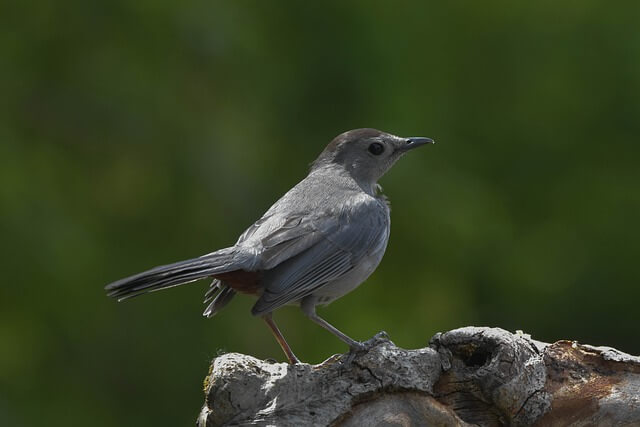
Gray Catbirds, with their distinctive mewing calls and sleek gray plumage, have a diverse diet that includes spiders, making them valuable contributors to ecological balance. Their consumption of spiders offers several benefits, both to the catbirds themselves and to their surrounding environment.
Spiders provide essential protein and nutrients, making them a nutritious food source for catbirds during various stages of their life cycle, such as breeding and migration. By keeping spider populations in check, catbirds play a role in controlling potential pest outbreaks, which can help maintain a healthy ecosystem.
To attract Gray Catbirds to your garden, create a welcoming habitat with dense shrubs and bushes, which they often use for nesting and cover.
Provide a consistent source of water and a diverse menu of offerings, including insects, fruits, and berries, to encourage these charismatic birds to frequent your outdoor space, contributing to both its natural beauty and ecological balance.
American Crows
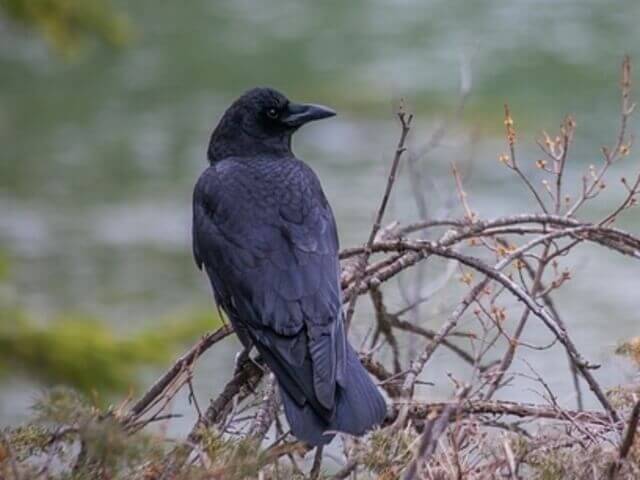
The American Crow, often seen as a symbol of intelligence and adaptability, has an omnivorous diet that includes spiders among various other foods. Their consumption of spiders offers benefits to both the crows and the environment.
Crows help control spider populations, preventing potential outbreaks and promoting a healthier ecosystem. Spiders provide a protein-rich food source that can be particularly important during the breeding season when crows need to nourish their young.
To attract American Crows to your area, ensure there are suitable nesting sites, such as tall trees or structures. Additionally, offering a diverse array of foods like nuts, seeds, and occasional meat scraps can make your space more appealing to these highly intelligent birds.
However, it’s important to remember that crows are known for their keen problem-solving abilities, so be mindful of their behavior to maintain a harmonious coexistence.
Common Blackbirds
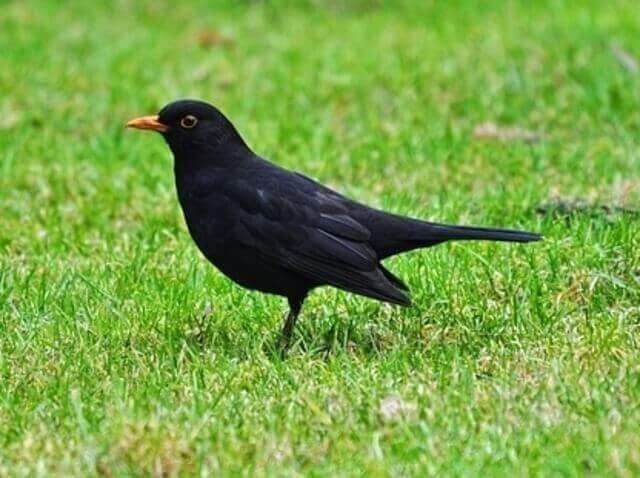
The Common Blackbird, a familiar sight in gardens and woodlands across Europe and parts of Asia, plays a vital role in pest control through its consumption of spiders, among other insects. This dietary preference brings several benefits to both the blackbirds and the environment.
By feeding on spiders, blackbirds help keep arachnid populations in check, which, in turn, contributes to a healthier ecosystem and reduces potential garden pests.
Spiders provide a valuable source of protein and nutrients, which are essential for blackbirds, especially during the breeding and molting seasons when their dietary requirements are higher.
To attract Common Blackbirds to your outdoor space, provide suitable nesting sites, such as dense shrubs or trees, and offer a variety of foods, including fruit, berries, mealworms, and suet, to create an inviting habitat that encourages these charismatic birds to visit and contribute to the natural balance of your garden.
Barn Swallows
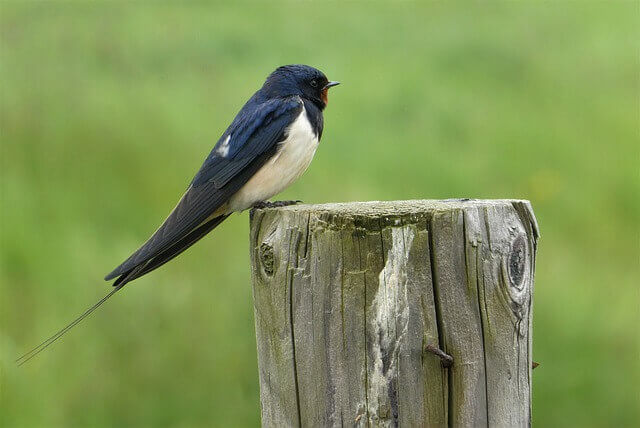
Barn swallows, with their distinctive forked tails and aerial acrobatics, are remarkable insectivorous birds that play a vital role in maintaining ecological balance through their diet, which includes spiders. These agile birds are beneficial for several reasons.
Firstly, their consumption of spiders helps control insect and arachnid populations, thus assisting in pest management in areas where they reside. Secondly, barn swallows are essential pollinators, contributing to the reproduction of various plants while spreading seeds.
To attract barn swallows to your property, you can create suitable nesting sites like open barns, porches, or ledges. These birds prefer nesting near open spaces with ample opportunities for aerial foraging.
Providing a consistent source of water and maintaining a diverse insect population in your vicinity will further encourage barn swallows to frequent your area, contributing to a healthier ecosystem and an impressive display of their graceful flight patterns.
When to Encourage Birds to Eat Yard Spiders?
Encouraging birds to eat yard spiders can be beneficial for your local ecosystem and garden. Here are some key considerations for when to do so:
- Seasonal Spider Abundance: Observe the seasonal patterns of spider populations in your yard. If you notice an increase in spider numbers, especially during the warmer months, it’s an ideal time to encourage birds to help control the spider population.
- Garden Pest Control: Birds that feed on spiders can also help control other garden pests, such as insects. Consider promoting bird activity when you have a pest problem that birds can help address.
- Nesting Season: Be mindful of the nesting season for local bird species. Encourage spider consumption before or after this period to avoid disturbing nesting birds or their young.
- Feeding Stations: Set up bird feeders or bird baths in your yard to attract birds. This will create a welcoming environment for them and encourage their presence.
- Native Species: Focus on attracting native bird species to your yard, as they are more likely to feed on local spiders and pests. Planting native vegetation can help attract these birds.
- Consistent Water Source: Ensure a consistent water source in your yard, as birds need water for drinking and bathing. A birdbath or shallow dish of water can be a magnet for insect-eating birds.
- Safety: Avoid the use of pesticides in your garden, as these can harm both birds and the insects they feed on. Promote natural pest control through birds instead.
By considering these factors and fostering a bird-friendly environment in your yard, you can encourage birds to naturally control the spider population and contribute to a healthier and more balanced ecosystem.
How Do I Keep Spiders Away From My House?
Keeping spiders away from your house involves a combination of preventive measures and natural remedies. Here’s how:
- Seal Entry Points: Inspect your home for gaps, cracks, and openings in doors, windows, and walls. Seal these entry points with caulk or weather stripping to prevent spiders from entering.
- Clean Regularly: Spiders are drawn to clutter and dust. Clean and declutter your home regularly, paying attention to corners, ceilings, and hidden spaces.
- Remove Webs: Regularly remove spider webs using a broom or vacuum cleaner with a long wand attachment. This disrupts their living spaces.
- Outdoor Maintenance: Keep outdoor areas around your house clean and well-maintained. Trim bushes, trees, and shrubs near your home to eliminate hiding spots for spiders.
- Reduce Lighting: Spiders are attracted to light sources, which also attract their prey. Use yellow or sodium vapor lights instead of white lights, as they are less attractive to insects and spiders.
- Use Essential Oils: Some essential oils, like peppermint, eucalyptus, and lavender, can deter spiders. Mix a few drops of these oils with water in a spray bottle and apply it around windows, doors, and corners.
- Vinegar: A mixture of water and white vinegar (1:1) can be sprayed in spider-prone areas to repel them.
- Citrus Peels: The scent of citrus, like lemon or orange peels, can deter spiders. Place them in areas where spiders tend to enter.
- Cedar: Cedarwood has natural insect-repelling properties. Use cedar blocks, chips, or essential oil in closets, attics, or near entry points.
- Professional Pest Control: If your spider problem persists, consider hiring a pest control professional who can provide effective treatments and ongoing prevention.
Remember that spiders can be beneficial because they prey on other insects, so you might not want to completely eliminate them from your surroundings. Focus on reducing their presence while maintaining a balanced ecosystem.

